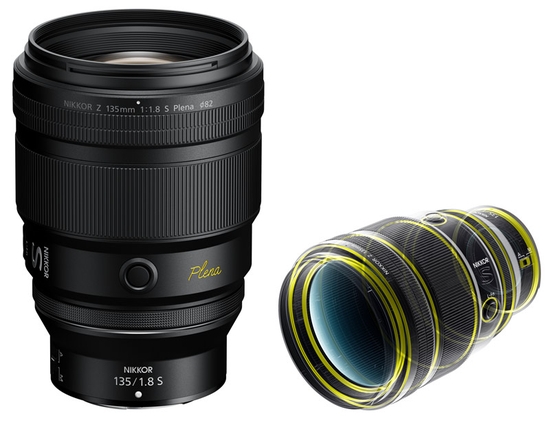
A new visual experience.

- 135mmVersatile Medium Telephoto
- f/1.8Large Aperture
- PrimeFixed Focal Length
- S-LineSupreme Optics & Design
- Z MountFull-Frame/FX Format
Shot with the Plena.
Groundbreaking peripheral illumination.
A lens only Nikon could create.
The extra-wide diameter of Nikon’s Z mount allows for a larger curved rear element that projects light evenly across a full-frame image sensor.
Exquisite foreground and background bokeh.
Fast, accurate and near-silent autofocus.
Add a new dimension to your footage.
Smooth, precise focus pulls with minimal breathing.
Linear focus is available in either rotation direction when using compatible Z series cameras, and your framing remains remarkably consistent even when moving focus from the foreground to the background.
Power aperture makes it easy to maintain your lighting.
Use the clickless control ring or your camera’s Fn1 and Fn2 buttons to smoothly, steplessly open and close the aperture, allowing you quickly to respond to lighting changes beyond the reach of Auto ISO.
Premium handling &craftsmanship.

Technology

Aspherical Lens
A lens with a curved, non-spherical surface. Used to reduce aberrations and enable a more compact lens size. Aspherical lenses minimize coma and other types of lens aberrations, even when used at the widest aperture. They are particularly useful in correcting distortion in wide-angle lenses and help contribute to a lighter, more compact design by reducing the number of standard (spherical) elements necessary. Aspherical lens elements correct these distortions by continuously changing the refractive index from the center of the lens.

ED (Extra-Low Dispersion) Glass
An optical glass developed by Nikon that is used with normal optical glass in telephoto lenses to obtain optimum correction of chromatic aberrations.

Short-Wavelength Refractive Lens
SR is a high- and specialized-dispersion glass lens that refracts light with wavelengths shorter than that of blue. By controlling short-wavelength light, the lens is able to achieve highly precise chromatic aberration compensation so that the colors in your images are more accurately reproduced. It also allows for more flexible optical designs, which allows for compact, lighter lenses to be designed.

Meso Amorphous Coat
Meso Amorphous Coat* realizes the highest anti-reflection performance in NIKKOR history. Meso Amorphous Coat provides an effect superior to that of Nano Crystal Coat for diagonal incident light, and an effect equivalent or superior to ARNEO Coat for vertical incident light. With its superb performance, ghost and flare caused by incident light from various directions are noticeably reduced, delivering clear images even under harsh conditions. *With this coating system, amorphous particles, that are even smaller than nano particles, are utilized to create even more gaps within the coating to form an ultra-fine mesoporous structure, attaining a lower refractive index. In addition, a higher-precision base coat is employed to further enhance the anti-reflection effect.

ARNEO Coat
An anti-reflective coating developed by Nikon and used in conjunction with Nano Crystal Coat to further reduce ghost and flare effects caused by incident light entering the lens vertically. This allows for the outstandingly clear capture of images even when a light source is located within the frame.

Stepping Motor
NIKKOR Z lenses use a stepping motor for fast, accurate, smooth, quiet autofocus with reduced wobbling. This quiet drive system makes the lenses ideal for use when shooting video.

A/M
A/M stands for Auto-Priority Manual Mode. This mode also enables an easy transition from autofocus to manual during AF operation. However, mode switch sensitivity has been altered to reduce the possibility of sudden unintentional switching to manual focus while shooting.

IF Lens
A NIKKOR lens in which only the internal lens group shifts during focusing. Thus, IF NIKKORS do not change in size during AF operation, allowing for compact, lightweight lenses capable of closer focusing distances. These lenses will be designated with the abbreviation IF on the lens barrel.

Electromagnetic Diaphragm Mechanism
An electromagnetic diaphragm mechanism in the lens barrel provides highly accurate electronic diaphragm or aperture blade control when using auto exposure during continuous shooting.
LCD, Video and Photo Gallery images are for illustrative purposes only
Tech Specs
Focal Length
135mmMaximum Aperture
f/1.8Format
FXApprox. Dimensions (Diameter x Length)
3.9 in.98 mmx5.5 in.139.5 mmApprox. Weight
35.1 oz.995 g
- Mount TypeNikon Z Mount
- Focal Length135mm
- Maximum Aperturef/1.8
- Minimum Aperturef/16
- FormatFX
- Maximum Angle of View (DX-format)12°
- Maximum Angle of View (FX-format)18°10′
- Maximum Reproduction Ratio0.2x
- Lens Elements16
- Lens Groups14
- Compatible Format(s)FX, DX
- Diaphragm Blades11
- Arneo CoatYes
- ED Glass Elements4
- Aspherical Elements1
- AutofocusYes
- Internal FocusingYes
- Minimum Focus Distance2.69 ft (0.82 m) from focal plane
- Focus ModeAuto/Manual
- E-typeYes
- Filter Size82mm
- Accepts Filter TypeScrew-in
- Approx. Dimensions (Diameter x Length)3.9 in.98 mmx5.5 in.139.5 mm
- Approx. Weight35.1 oz.995 g
- Lens TypePrime
Support
Product Registration
Registering your Nikon product allows us to send you (with your permission) important updates, service information and helpful hints, and it makes it easier should you ever need to call in for help.
Register your product online now.Nikon Answers Site
We store all resolved problems in our solution database. If you can’t find a relevant answer, feel free to submit a question to our technical support team.
View Questions & Answers

